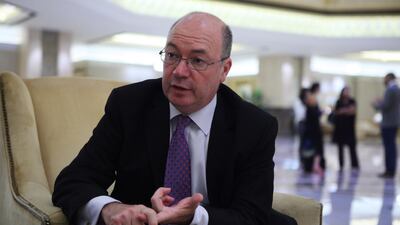Houthi forces were accused on Thursday of blocking aid deliveries in Yemen as the rebel commanders profiteer from taxes and impose ideologically-driven barriers to vaccination campaigns.
Alistair Burt, Britain's middle east minister, told parliament that efforts to ensure greater access for aid to the Yemeni population with the Arab coalition should not draw away attention from the role of the rebels in blocking distribution within the country.
Overall the humanitarian situation could be judged “better than it was” but within that assessment new concerns had arisen. Speaking of the series of missile attacks from Houthi-controlled areas that have targeted Riyadh and the border areas at Jizan, Mr Burt said there had been a deterioration of conditions in rebel parts of Yemen.
“It is not simply a matter of the restrictions by the coalition after they found missiles directed by Houthi rebels, missiles that were being smuggled into Yemen in some way and therefore that required restrictions on their points of entry," he said.
In recent months the restrictions have been eased, partly as a result of diplomatic efforts to bolster monitoring at the ports and to assure the coalition “the world will do its part” to prevent attacks.
Balanced against this was greater challenges elsewhere. “We have all noticed that Houthi-controlled areas have become more difficult to access,” Mr Burt told members of the upper chamber, the House of Lords. “They take taxes from goods that come in, in order to finance themselves, enrich themselves. They’ve been restrictive in relation to vacccines as well.
__________
Read more:
UN special envoy to Yemen meets with officials in Riyadh
Yemeni military looks to cut off main Houthi supply route
The spark in the Houthi coup — Saleh Al Sammad
__________
"As well as being concerned about access of goods and therefore the behaviour of the coalition, we have to be very clear-eyed about what is happening on the ground with the Houthis and the control they are exercising over areas.”
The pressing need to resolve the food and disease crisis affecting Yemen has given greater urgency to political efforts to resolve the conflict. Mr Burt said that there was “a reasonably settled view” within government that a military solution was unlikely. With better outreach to all parties, Martin Griffiths, the new UN envoy to Yemen, had already spoken of elements of a political solution being closer at hand.
Mark Lowcock, the UN’s humanitarian co-ordinator, has said the situation in Yemen is a near apocalypse, with 8.4 million people needing support to eat their next meal. The official is particularly worried about a new cholera epidemic, worse than the outbreak last year that affected the health of more than one million.
Mohammed Al Jabir, Saudi ambassador to Yemen, told a conference in Riyadh this week that his country had steadily increased assistance for the needy but criticised Houthi influence.
“Iran-backed Houthi militias had impeded the delivery of humanitarian aid to Yemen and had looted the country’s Central Bank,” he said.
Meanwhile Yemeni minister of human rights Mohammed Mohsen Al Asker has said that out of more than 13,000 deaths attributed to Houthi actions, 1,353 children are believed to have been killed by rebels.
Behind the front line, the militia had taken a repressive turn with a “crackdown on dissent” amid the power struggle following the execution of ex-president Ali Abdullah Saleh last December.
Clashes broken out after Saleh sought engagement with the coalition for a way out of the impasse and thousands of Saleh’s loyalists, who were in a marriage of convenience with the Houthis, were targeted as suspects. The Saleh loyalists found themselves outnumbered in rebel-held Sanaa after their leader’s death.
In documents given to The National, the minister said the Iran-backed group are responsible for 13,389 deaths and 30,150 injuries from the start of the conflict until February 2018. Torture was rife in the militia-run detention facilities.
"More than 17,800 detainees have been held in Houthi prisons since the conflict began and it is believed that 6,700 are still detained by the Houthis," Dr Asker told The National, "From the prisoners, 130 of them were tortured to death, while most of those who are being detained in the militia prisons have been maimed."

